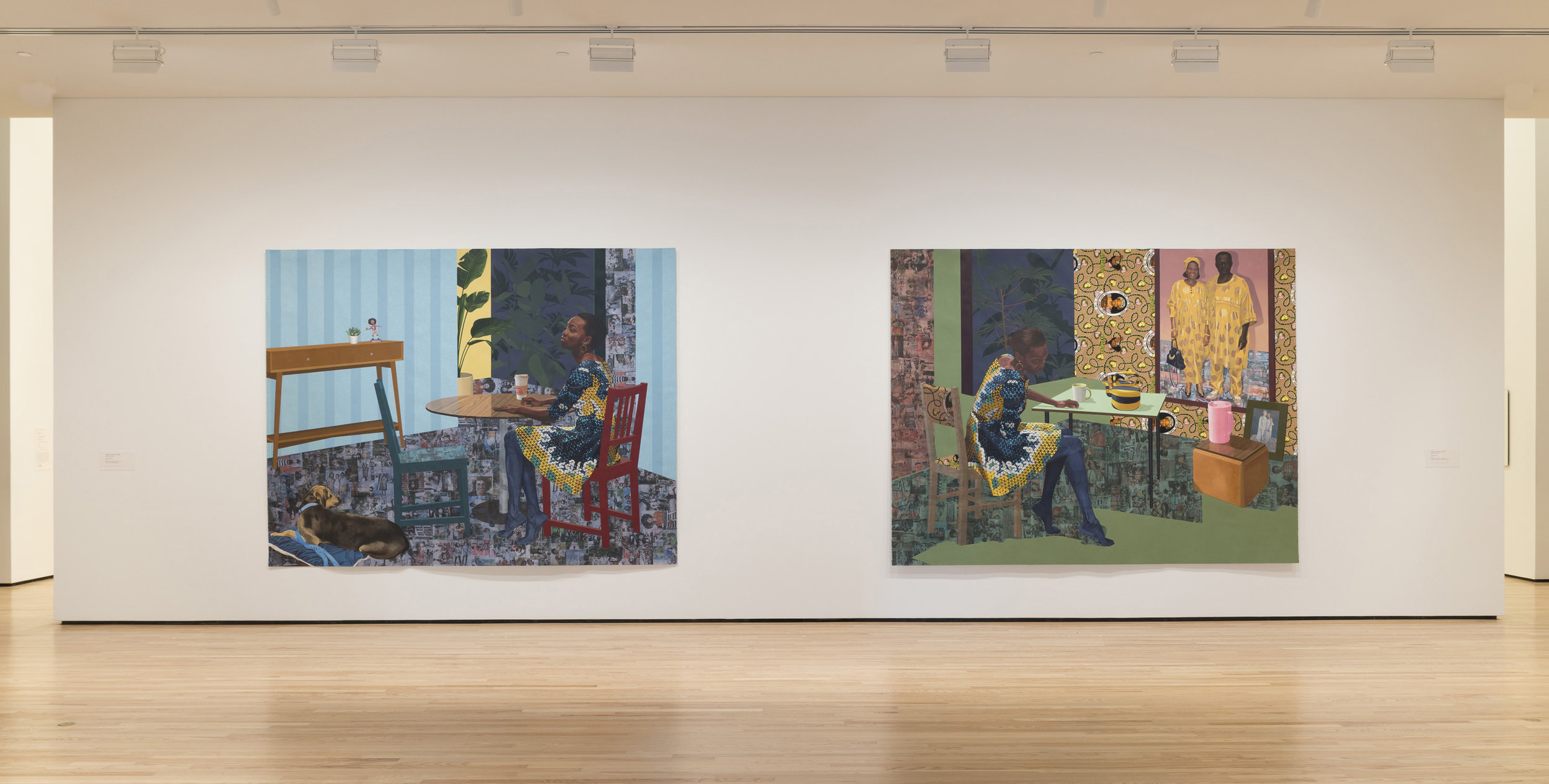Njideka Akunyili Crosby on Intimacy and Race in 'Counterparts'
Njideka Akunyili Crosby. Dwell: Aso Ebi. 2017. © Njideka Akunyili Crosby. Courtesy the artist and Victoria Miro, London. Photography Brian Forrest.
On a brisk Saturday, I spent nearly an hour viewing newly minted MacArthur Foundation Genius, Njideka Akunyili Crosby’s, suite of six new mixed-media paintings, From Room: Njideka Akunyili Crosby | Counterparts at the Baltimore Museum of Art. Truth be told, I could have spent another three hours looking at the pairs of paintings as they are layered with meaning (literally and figuratively).
Akunyili Crosby has become an art world superstar for her depictions of private interiors which reflect her life experiences including growing up in Nigeria, completing two degrees in Fine Arts in the U.S. and now living and working in Los Angeles. The three pairs (Dwell, Home, As We See You) of nearly life-size paintings are typical of her work employing signature techniques such as the acrylic paint, color transfer, pencil, and collage on flat paper versus working on traditional canvas on stretcher board. The work, however, is a new interpretation of techniques such as perspective and still life painting.
Njideka Akunyili Crosby. Home: As You See Me. 2017. © Njideka Akunyili Crosby. Courtesy the artist and Victoria Miro, London. Photography Brian Forrest.
Njideka Akunyili Crosby. As We See You: Dreams of Jand. 2017. © Njideka Akunyili Crosby. Courtesy the artist and Victoria Miro, London. Photography Brian Forrest.
The paired paintings Dwell: Me, We and Dwell: Aso Ebi depict the same woman in a brightly colored yellow and blue mud cloth dress (or Aso ebi, a traditional West African uniform dress) at a dining table in Los Angeles and Nigeria. The artist cunningly indicates the differences in location through the paper coffee cup in the scene of Los Angeles and the proper teacup and teapot in the Nigerian home. The symbolism and objects in Dwell: Me, We are clever in their placement. Most significant are the bobble-head doll of football player turned activist, Colin Kaepernick, on the buffet table and an image of Angela Davis in the collage on the floor. There is deep personal symbolism in Dwell: Aso Ebi from the photo of Akunyili Crosby and her white American husband, Justin, framed on the far right side of the work in addition to brightly colored wallpaper made from her late mother’s political campaign advertisements.
The juxtaposition of these interiors speak to Akunyili Crosby’s hybrid experiences as a Nigerian, now living in the United States and the racism that comes with that. This is indicated in all six paintings but, most clearly, in the still life pair As We See You: Embarrassment of Riches and As We See You: Dreams of Jand. Embarrassment of Riches shows a woman in Los Angeles looking through a mirror looking at an excessive table of desserts some of which are held by derogatory statues of black people. Dreams of Jand, a still life from a Nigerian home, reflects the great influence of British colonialism, through products and aspirations, which the title indicates (Jand is slang for England in Nigeria).
Installation view 1, Front Room: Njideka Akunyili Crosby | Counterparts. Photo by Mitro Hood.
Installation view 2, Front Room: Njideka Akunyili Crosby | Counterparts. Photo by Mitro Hood.
Installation view 3, Front Room: Njideka Akunyili Crosby | Counterparts. Photo by Mitro Hood.
The artist’s work is unique in the way that implicates viewers as onlookers for their interest in her “otherness,” as an immigrant, as black woman. Akunyili Crosby’s colorful mixed media paintings search for notions of home and identity in our increasingly complicated world. Ultimately, the work indicates that no matter where you are, familiar or not, “home” is universal.
Front Room: Njideka Akunyili Crosby | Counterparts organized by Kristen Hileman, Senior Curator of Contemporary Art, is on view at the Baltimore Museum of Art until March 8, 2018.











